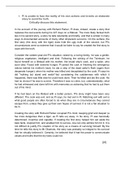1. Pi is unable to face the reality of his own actions and invents an elaborate
story to avoid the truth.
Critically discuss this statement.
In his account of the journey with Richard Parker, Pi does, indeed, create a story that
replaces the real events during his 227 days on a lifeboat. The more likely factual truth
lies in his second story, a story he tells reluctantly and briefly, and that is similar in many
ways to documented accounts of many other shipwreck survivors. On the surface, the
first story (the story with the tiger) does hide the ugly truth of the second, but Pi's
circumstances were so extreme that it would be fairer to say he created the first story to
cope with the truth.
Consider the sixteen-year-old Pi's situation: raised by a loving family, he was a gentle,
religious vegetarian, intelligent and kind. Following the sinking of the Tsimtsum, he
found himself on a lifeboat with his mother, the brutal ship's cook, and a sailor, who
soon died. Faced with extreme hunger, Pi joined the cook in finishing the emergency
rations behind his mother's back; he ate a strip of the dead sailor's flesh (again from
desperate hunger); when his mother was killed and decapitated by the cook, Pi says he
did "nothing but stand and watch"-but considering the suddenness with which it
happened, there was little else he could have done. Then he killed and ate the cook. He
had no choice if he was to survive. Therefore it was no crime, but, understandably, what
he had witnessed and done left him with memories so sickening that he had to put them
out of his mind.
If he had been on the lifeboat with a better person, Pi's story might have been very
different. The cook was evil, and as Pi says, he met evil in Pi. Matching evil with evil is
what good people are often forced to do when they are in circumstances they cannot
escape from, unless they give up their own hopes of survival. It is not a fair situation to
be in.
Creating the story with Richard Parker occupied Pi's mind, keeping grief and despair (a
foe more dangerous than a tiger, as Pi tells us) away. In his story, Pi was heroically
determined, inventive and capable. If creating the first story helped him set aside the
bare facts, inspired him, and enabled him to survive, one can only admire him for it. It is
not difficult to justify Pi's creation of his story as a means of surviving himself. By the
time he tells this story to Mr Okamoto, the story was probably so integral to his survival
that he virtually believed it. Certainly, he believed that it had the power to communicate
values and truths that the dry facts could not.
[25]




